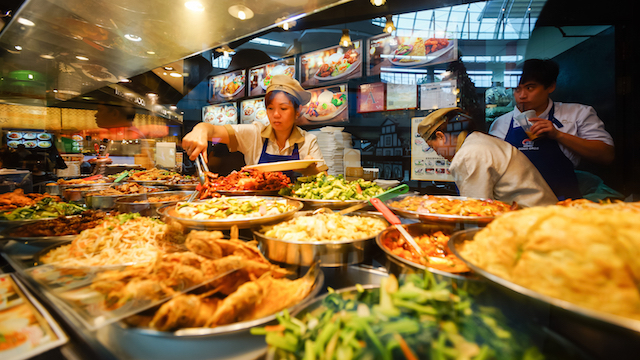The Singapore F&B sector is set for a radical transformation under the government’s Industry Transformation Maps, aimed at getting industry “future-ready”.
Tharman Shanmugaratnam, deputy PM and coordinating minister for economic and social policies, revealed some insights in a speech at the opening of Select Group’s new corporate headquarters on Thursday.
He said with 160,000 people working in the F&B industry, it was a significant employer in the city state, 205,000 if hawkers’ centres were included, more than 5 per cent of the nation’s workforce.
“But that is also the industry’s biggest challenge. We are running out of manpower in the industry. Our strategies for the future have to address this squarely.
“We must develop a food services industry that is highly efficient, with no loss in quality of food offerings, and with high quality jobs. It has to be a major makeover.”
The Food Services Industry Transformation Map (ITM) would involve “intensive collaboration” between Spring Singapore, the Restaurant Association of Singapore (RAS), enterprises themselves and trade unions such as the Food, Drinks & Allied Workers Union.
The Food Services ITM will aim to push ahead with more ‘manpower-lean formats’ in the industry and upgrade jobs and job satisfaction, while maintaining the quality and range of Singaporeans’ dining options.
There are four main thrusts of the Food Services ITM:
* Developing innovative formats like Ready-to-Eat meals.
* Promoting mass adoption of technologies even within established business formats.
* Raising employees’ skills and versatility, and making the industry more attractive through job redesign and clear progression pathways.
* Expanding the footprint of Singapore F&B in overseas markets.
“Spring estimates that by 2025 three out of eight dining experiences in Singapore will involve new formats such as grab-and-go and vending machines, as opposed to traditional dine-in options. It will be more efficient, and will also meet changing consumer demands.
“Ready-to-eat (RTE) meals, for instance, are a viable alternative for consumers looking for convenience. The new generation of RTE meals is much more than just “microwavable food”. Utilising “cook-chill technologies” as well as innovations in packaging material, the taste, quality and nutritional content of foods can be retained well in RTE meals,” he said.
“Last month, we launched VendCafé in Anchorvale. The response has been encouraging, with an average of 400 meals served per day in the first month. Residents have given feedback that they welcome the additional amenities. However, some have expressed concerns about the noise patrons generate, sometimes late at night.”
Coffee shops are not immune to new systems, he said.
“Spring and the HDB have reviewed the tender requirements for new coffee shops. The requirements will now include productivity proposals, in addition to a good variety of affordable food. I urge operators to make use of this opportunity to rethink how existing coffee shop models can be redesigned. For a start, the new system will be piloted at two sites, in Tampines and Choa Chu Kang. The tender will open from mid-September onwards.”
Manpower challenge
The minister said employers have to work on the basis that there will be no further manpower growth in the Singapore F&B industry.
“The heavy reliance on low-skilled workers also cannot continue. New entrepreneurs have to come into the business knowing how tough it is to find workers. The industry sees a high churn of enterprises. On average, 28 per cent of food establishments are replaced yearly. Some churn in the industry is not a bad thing – it adds vibrancy and reflects Singaporeans wanting to do their own thing as entrepreneurs. But every new enterprise has to be aware of the realities of the labour market before they get started.”
One of the ways forward is to embrace digital service, including electronic payments.
“In Sweden, cash transactions represent less than 2 per cent of the value of all payments made. From retailers to street level vegetable and fruits traders, Swedish businesses have embraced the use of electronic payments via credit cards or mobile apps. This enables companies to increase productivity through payments integrated with business processes. We will be promoting this very actively.
“We must transform the food services industry so that it achieves. Spring together with its partners plans to have at least 50 per cent of the industry having adopting technology-enabled operations by 2020. They estimate that it will make possible productivity growth in Food Services of 2 per cent per year on average from now until 2020.”






